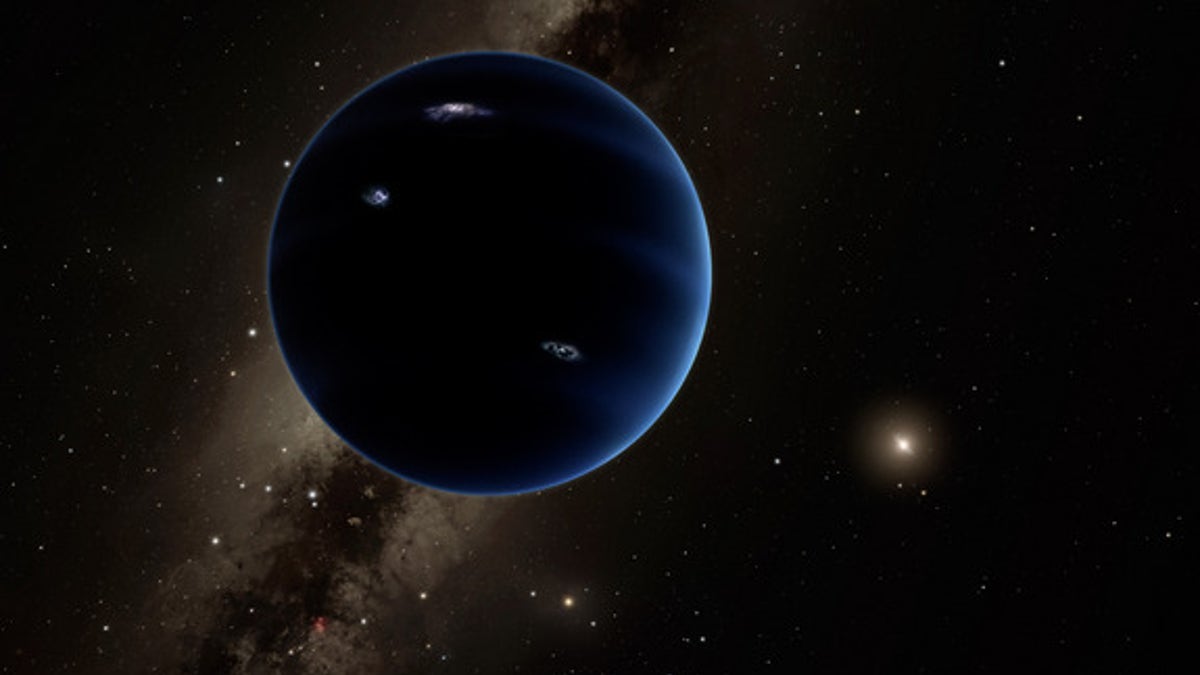
Artist’s illustration of “Planet Nine,” a hypothesized world about 10 times more massive than Earth that may orbit far beyond Pluto. (Caltech/R. Hurt (IPAC))
Evidence for Planet Nine continues to mount, but there may be a good reason why scientists have yet to find it – it may be hiding.
In October 2017, NASA released a statement saying that Planet Nine may be 20 times further from the Sun than Neptune is, going so far as to say "it is now harder to imagine our solar system without a Planet Nine than with one."
But the reason it may not yet have been found is due to that same distance. At that distance, the equivalent, of 600 astronomical units (1 AU is defined as the distance between the Earth and the Sun, or approximately 93 million miles), it would be 160,000 times dimmer than Neptune is. Kevin Luhman, an astronomer at Pennsylvania State University, told Quanta Magazine by way of the Washington Post that at 1,000 AU, it's a "brick wall, basically," making any potential planet next to impossible to see using current technology.
NASA SAYS EVIDENCE FOR 'PLANET NINE' IS MOUNTING
However, scientists believe the possibility of another planet, one which may have "10 times the mass of Earth," does indeed exist.
“Every time we take a picture, there is this possibility that Planet Nine exists in the shot,” Surhud More, associate professor in Kavli Institute for the Physics and Mathematics of the Universe at the University of Tokyo, told Quanta Magazine.
Slashgear reports that it could take up to 1,000 years before the planet is found.
Michael Brown from the California Institute of Technology has said he thinks “Planet Nine” will eventually be found, but it will take significantly stronger telescopes and planet finding technology than currently exist.
In the Oct. 2017 statement, Caltech planetary astrophysicist Konstantin Batygin, who worked with Brown, said that there "five different lines of observational evidence" that point to the existence of the planet.
The five lines of evidence are:
- Six known objects in the Kuiper Belt, all of which have elliptical orbits that point in the same direction.
- The orbits of the objects are all tilted the same way; 30 degrees "downward."
- Computer simulations that show there are more objects "tilted with respect to the solar plane."
- Planet Nine could be responsible for the tilt of the planets in our solar system; the plane of the planets orbit is tilted about 6 degrees compared to the Sun's equator
- Some objects from the Kuiper Belt orbit in the opposite direction from everything else in the solar system.
"No other model can explain the weirdness of these high-inclination orbits," Batygin added. "It turns out that Planet Nine provides a natural avenue for their generation. These things have been twisted out of the solar system plane with help from Planet Nine and then scattered inward by Neptune."
SCIENTISTS MAY HAVE JUST FOUND A NINTH PLANET AND IT'S MASSIVE
"If you were to remove this explanation and imagine Planet Nine does not exist, then you generate more problems than you solve," Batygin also said. "All of a sudden, you have five different puzzles, and you must come up with five different theories to explain them."
Their work was published in a January 2016 paper that can be read in its entirety here.
News of a Planet Nine first surfaced in 2014, when researchers found a planetoid and a subsequent celestial body that appears to orbit around the Sun.
Follow Chris Ciaccia on Twitter @Chris_Ciaccia
This story has been updated to reflect that More's quote came from Quanta Magazine and not the Advocator. Fox News regrets this error.







































